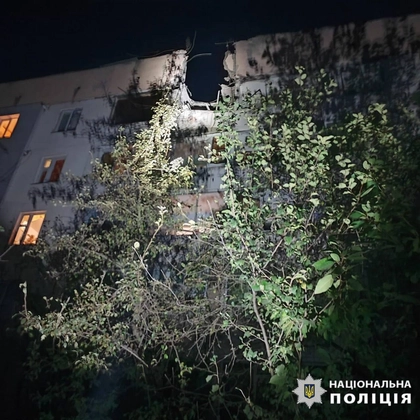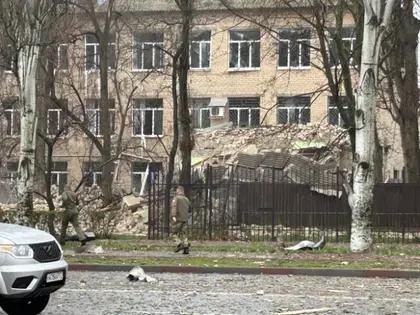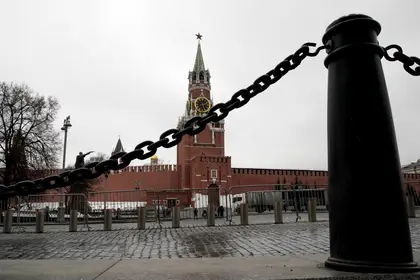Another salvo of long-range munitions struck the Russia-occupied city Melitopol on Wednesday, as Kyiv carried on with a campaign of precision strikes against military infrastructure deep behind Kremlin lines in the southern sector.
Live web cams followed by local social media and eventually Russian authorities reported between eight and ten explosions in and around the Melitopol rail switching station at 5:30 A.M. The strikes threw columns of black smoke into the sky and set fires, some content showed. Other video showed flashes lighting up the nighttime sky after each detonation.
The first official reaction, from the Russia-controlled city administration four minutes later, told citizens the situation was under control, that “the city is under the reliable protection of air defenses” and that no one should panic. A half hour later an official statement appeared confirming Ukrainian munitions had hit the city’s locomotive depot and that “infrastructure was damaged”.
Official statements reported no casualties. Ivan Federiv, the Melitopol mayor-in-exile, in a Telegram statement said most of the city, and some villages to the west, suffered a black-out. Pro-Russian authorities confirmed power losses in the city but did not publicize details on the scale.
A regional center with a pre-war population of 150,000, Melitopol was overrun by Russian troops in late Feb. 2022 and since then has become a key logistics hub for Moscow’s forces. The closest reasonable launch site for Ukraine’s most widely-used long-range precision-guided weapon capable of reaching Melitopol’ targets, the US-made M31 missile, is some 80 km. from the city.

Kyiv Hit by Massive Drone Attack as Russian Strikes Target Multiple Ukrainian Cities
Russian military commentator Boris Rozhin, a frequent participant in Kremlin-controlled media news programs, on Mar. 27 accused Armed Forces of Ukraine (AFU) gunners of firing four long-range missiles at a Melitopol “dormitory,” of which two made it to the target. The strike forced the evacuation of 46 civilians, most university students, Melitopol occupation authority mayor Andrei Chuikov said in statement to official city media.
Ukraine’s Army General Staff (AGS) in a same-day situation update said its artillery had fired weapons at a Mariupol barracks and command center occupied by Russian troops.
A chain of blasts on Mar. 20 hit railroad infrastructure and military installations in the Crimean city Dhzankoi, a rail hub some 150 km. from the nearest possible firing sites in Ukraine-controlled territory, and well out of range of precision-guided missiles sent to Ukraine by the US since May. AFU spokesman said Ukrainian forces were responsible for the strike but did not offer details on the weapon used.Ukrainian army spokesman Serhiy Baranov in a Mar. 21 statement claimed a flight of kamikaze drones was responsible for the attack on railway intersections, and on a trainload of long-range, heavyweight Kaliber missiles – a weapon used by the Kremlin since October to bombard Ukrainian cities and towns.
The Dzhankoi strikes were part of a systematic AFU strategy to degrade and ultimately take offline Russian rail and road communications between Melitopol and Russian bases in Crimea, Baranov said.
AFU Joint Forces South spokeswoman Nataliya Humeniuk in a press briefing paper made public the same day said: "If you recall the map of occupied Crimea, in particular, railway communications, then this (Dzhankoi) is a junction station. At the beginning of a full-scale invasion, it was said that the defeat of logistics would be the main method of influencing the enemy’s (Kremlin’s) perception of what he is capable of in Crimea. At the moment, the trend is clearly being demonstrated that it will (soon) no longer be possible to leave (Crimea) by rail."
Senior Ukrainian officials, most recently Defense Minister Oleksii Reznikov on Wednesday, have stated repeatedly that the AFU will kick off a Spring offensive in the coming months, and that degradation and if possible Russian supply and logistics hubs in the path of that offensive should precede major ground attacks.
Security analysts in both Ukraine and Russia have said the southern sector with Melitopol as the AFU’s main objective could well be the offensive’s main focus because capture of the city would enable Ukrainian forces to isolate the Crimean peninsula, a critical air, land and ground forces base for the Russian military. The exact time and location of the offensive is a closely-guarded AFU secret.
You can also highlight the text and press Ctrl + Enter






